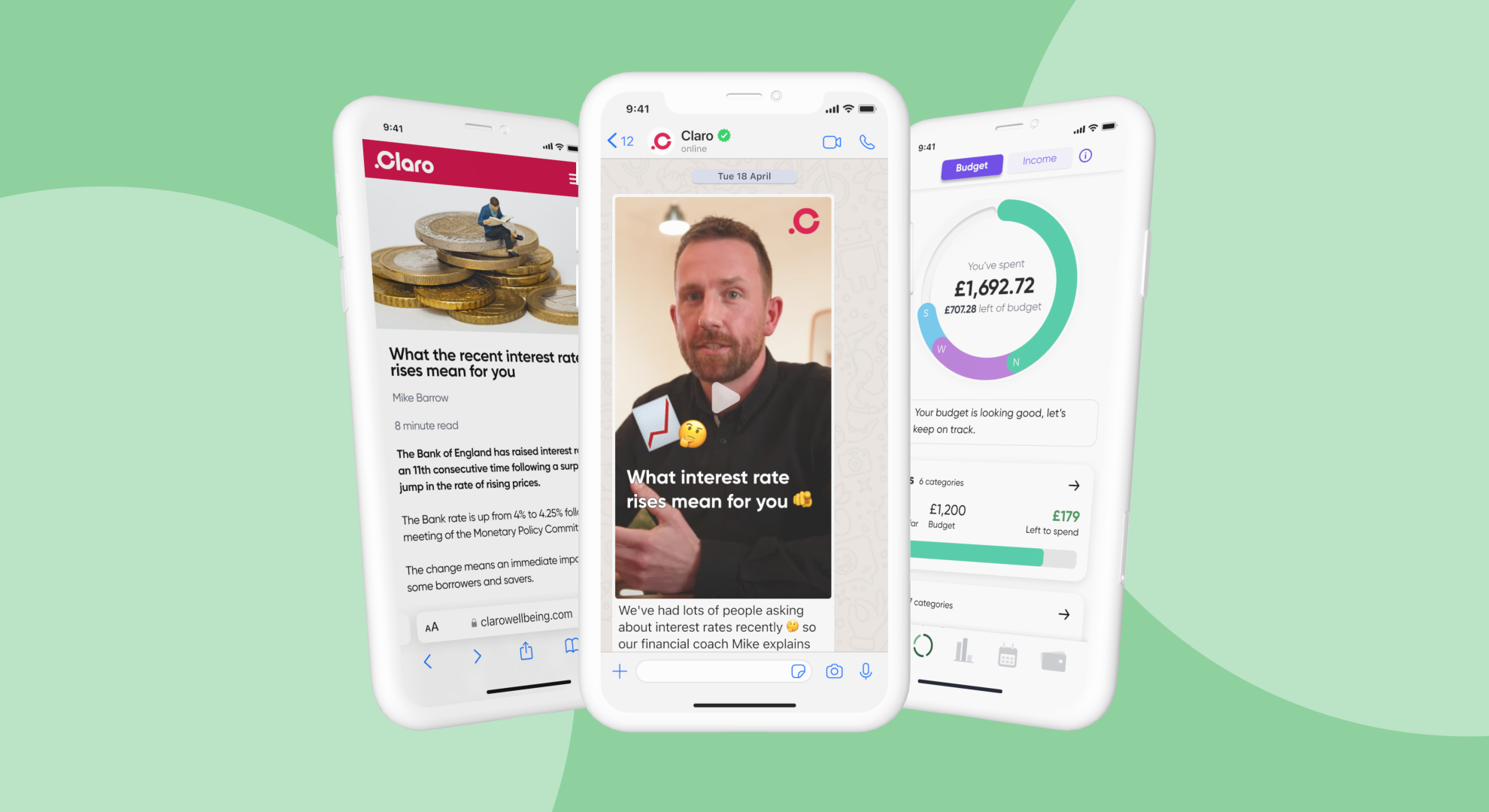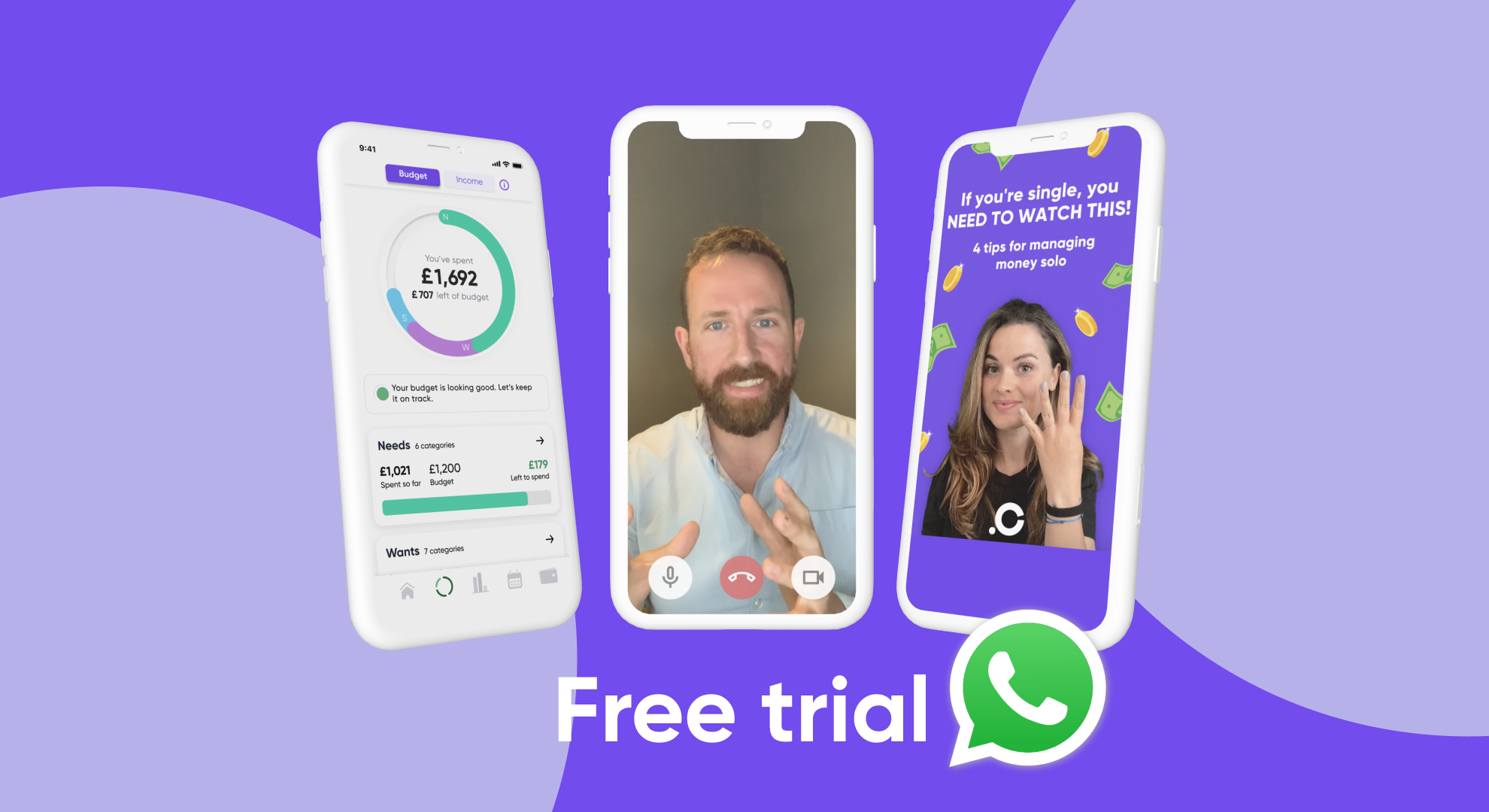6 min read
Should employers acknowledge Blue Monday?
Blue Monday (15 January) has a mixed reputation. But there’s still value in using the day to raise awareness of mental health and wellbeing...

Millions are being impacted by financial stress. Yet, until now, workers in frontline occupations have not been able to benefit from educational financial wellbeing support truly designed for them.
As of August 2023, 30.1 million people in the UK were in employment. But millions of them are being impacted by financial stress – people of every age group, every location and every industry. Mortgage rates, rent prices and household bills have all hit new highs.
As a result, 81% of UK workers want support with the cost of living crisis from their employer, according to Claro Wellbeing’s survey of 1,300 UK workers.
Graph showing 81% of workers in the UK want support from their employer around the cost of living, based on Claro Wellbeing's survey featured in The Workplace Today. The graph also shows that most workers across every industry want cost-of-living crisis support from their employers.
But most organisations are offering financial wellbeing and education products predominantly built for those who work at desks, despite desk-based workers making up a little over half of the UK’s workforce.
This leaves just under half of the workforce – those who work in frontline or deskless occupations – without access to financial wellbeing education and support that’s designed for them.
That’s why we’ve created a financial wellbeing solution that provides personalised guidance, engaging content and tools through WhatsApp.
As far as we know, it’s the first WhatsApp-based financial wellbeing service available for organisations to roll out to their people, at scale. And it’s even received recognition in the Financial Times as an example of an “innovative solution”.
We believe our new product marks a significant step forward in what the financial wellbeing market has to offer organisations and their people: chiefly, better user experience, greater personalisation and, as a result, higher employee engagement.
To understand why that’s the case, we need to look at where the financial wellbeing market is today and how it got to this point.
The financial wellbeing industry is often described as ‘new’. In reality, it has emerged at the confluence of two long-term trends: increasing demand for employee benefits and advances in financial technology.
Since the late 2000s (and thanks to software innovation), we’ve seen rapid growth in almost every area of personal finance. By 2011, 50% of the UK population was using online banking. We saw the rise of challenger banks like Monzo, enabling millions of people new ways to see their spending. And we saw the rise of investing apps, whose global user base more than tripled from 35.6 million in 2017 to 130 million in 2021, according to Finance Monthly.
Many of our fellow entrants in the financial wellbeing space have emerged out of this confluence, building new fintech products to service the ever-growing demand for benefits that keep companies attractive to talent and supportive to employees.
In 2022 inflation skyrocketed, covering us all in a fog of personal finance struggles, from which the UK is yet to emerge. A number of the world’s leading organisations’ UK arms – among them Ogilvy, Bacardi and Santander – teamed up with Claro Wellbeing to help support their employees.
In a country where people were already struggling due to rising house prices and household debt and falling real-term wages, the cost of living crisis has made matters worse.
Financial literacy in the UK remains low, too. Today’s times require personal finance savviness. But studies have revealed millions do not have the confidence to manage their money. Even before the pandemic, the number of people in the UK classified by the FCA as financially vulnerable stood at 24 million (February 2020) – a shocking 46% of the UK adult population. By May 2022, this figure increased to 24.9 million people (47%).
We’ve seen that hundreds of organisations in the UK are deeply concerned about their employees’ financial wellbeing – financial stress hampers employees from bringing their best selves to work.
Given financial stress impacts workers in every industry, employers of frontline workers must ensure they offer support that's truly inclusive.
But, until now, those employers have been held back. Because a critical area of fintech innovation has been missing: financial coaching and guidance at scale.
At Claro Wellbeing, we’ve created a new, intuitive way to make financial coaching and guidance available to everyone.
We believe our solution is the next generation of financial wellbeing. Not only does it meet everyone where they already are – WhatsApp – but it also allows personalisation at a one-to-one level, at scale.
When employees get personal finance coaching and guidance, a host of positive outcomes usually follow. Financial education programmes reduce financial stress (for example, see Blanco et al. 2023). And one-to-one financial coaching (see Theodos et al. 2018) helps people save money, improve credit scores and reduce debt.
But to create these kinds of outcomes in an employee benefit product, you also need to take into account employee engagement. You can have a great financial wellbeing product. But if user engagement and retention are poor, you won’t get the results you want.
In frontline industries, employee engagement is notoriously difficult to get. Engagement rates as low as 12% are not uncommon. And after speaking with many businesses, we’ve heard of engagement rates as low as 2%. When your work is physically demanding, you’re less likely to have time to engage in employee benefits.
So we set about a project to scope out what it would take to make our financial wellbeing platform available in an intuitive format – one that wouldn’t require a laptop, web app or even a new smartphone app.
As we set about solving this challenge, we came across the surprising fact that, in the UK, there are more people on WhatsApp than in employment. Research shows some 40.1 million people use the messaging app, compared to 30.1 million UK residents in employment.
Would WhatsApp make a suitable home for a new version of Claro Wellbeing? It certainly seemed promising. As we were developing our new product, the explosive growth of ChatGPT – from zero to 100 million users in two months – was showing just how intuitive the chatbox format of communication is. OpenAI’s large language model GPT 3 was out years before it developed ChatGPT. But it was ChatGPT’s simple chat interface that gave many people an accessible way to interact with AI for the first time. Just as the chatbox has finally put AI in many people’s hands for the first time, perhaps it could do so too for financial coaching and guidance.
And with our new product launched, so far, so good. Pilots have seen employee retention stats of over 99% across our user base. And we’ve seen promising signs that financial guidance is something many employees in frontline industries put a high value on.
Financial wellbeing over WhatsApp is not only an intuitive way for people to ask questions, get help and learn things. It also requires no changes in habits and no induction sessions. It doesn’t even require employees to have a password or email address.
But what’s critical to our mission at Claro Wellbeing is that it brings financial wellbeing to both deskless and desk-based workers. It’s financial wellbeing that’s truly financially inclusive. It’s designed for frontline workers, but it’s useful for everyone.
And that means organisations, concerned about the financial wellbeing of their employees, now have a practical means to allay those concerns. No longer do they need to be held back by a lack of great options for offering financial wellbeing across their workforce.
As we continue to roll out a number of pilots, we’ve also launched a 14-day free trial version of the product. If you’d like to assess whether Claro Wellbeing meets your organisation’s needs, try it out yourself.
Start your 14-day free trial of Claro Wellbeing |
|
|
|
Try speaking to an expert financial coach and budgeting. And discover our educational financial content. Assess whether Claro Wellbeing is right for your team. |

6 min read
Blue Monday (15 January) has a mixed reputation. But there’s still value in using the day to raise awareness of mental health and wellbeing...

4 min read
Ever wished you had a money-whiz friend you could ask anything, as often as you like?

7 min read
Millions are being impacted by financial stress. Yet, until now, workers in frontline occupations have not been able to benefit from educational...